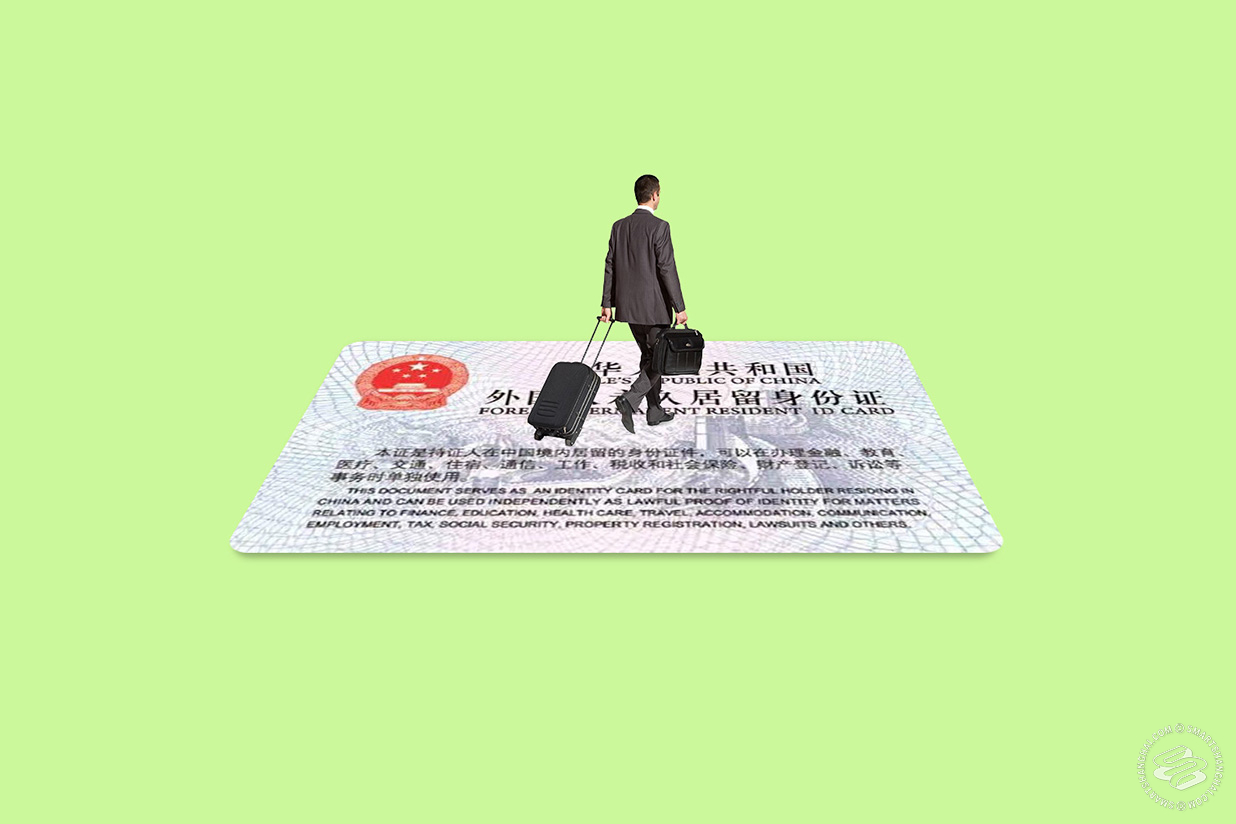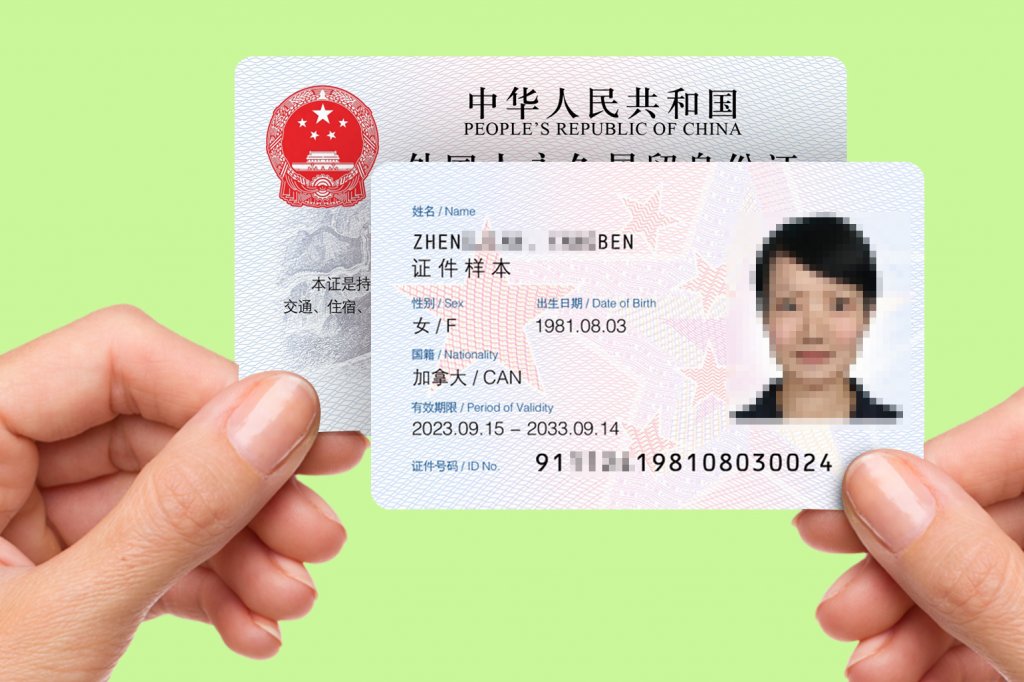Last updated: July 2025
The Chinese Green Card — yep, still what most people call it — is officially known these days as the "Five-Star Card" (五星卡). That's the government's new name for it, but among foreigners, it's better known as a Green Card or Permanent Residency. Whatever you call it, the meaning's the same: you've made it.
It's a combination of the Permanent Residence Permit, work permit, and identification card, valid for ten (sometimes five) years. It means you don't need a visa anymore, you can work just like a Chinese citizen, and you get most of the same rights when it comes to things like housing, education, investment, and healthcare.
The new card works more like a Chinese ID (shenfenzheng) — you can buy train and plane tickets, check into hotels, open bank accounts, and you can even use the Chinese citizen lane at the airport. Buying a house in Shanghai becomes much simpler, it's compatible with online platforms, and makes life a whole lot easier.
Pretty handy if you're planning to stick around for a while.
Here's everything you need to know in plain English, updated for 2025.
Can I Get One, Though?

The two most common ways to get a Green Card are:
- if you have a well-paid job and earn at least 880,000 rmb per year (might find one on SmartShanghai's job section?)
- if you've been married to a Chinese citizen for at least five years.
The application process can be long, inconsistent, and take up to a year. The list of requirements is specific, sometimes random, and definitely exhaustive.
We break it all down below.
What's New in 2025?
China tweaks its permanent residency rules every year or so — and 2025 brought some major changes:
- Salary requirements are up: For the work track in Shanghai, you now need to earn at least 886,104 rmb/year, and pay at least 177,221 rmb/year in individual income tax
- More scrutiny on physical presence: You need to have physically lived in China for at least six months every year for four years straight before applying.
- Some processing times are longer: For example, spousal PR applications are now taking closer to 12 months, instead of 6–9.
- Talent track is expanding: If you have a PhD or hold associate senior titles, you may qualify even if you haven't hit the usual work/tax benchmarks.

Who Can Apply?
A) High-Earning Professionals (Work-Based Track)
To qualify, you need to:
- Hold a work (Z) visa and be employed in Shanghai
- Earn at least 886,104 rmb/year
- Pay at least 177,221 rmb/year in personal income tax
- Have worked in China for four consecutive years, and have been in China each year for ≥ six months
- Have no criminal record, in China or abroad
B) Talent Track (PhDs, Professors, "High-Level" Titles)
If you're considered high-level, or you have an urgently needed talent, China may waive the salary and tax benchmarks and fast-track your PR application. Let's say you have this Stanford PhD and do "something with AI", this is for you. This requirement includes:
- PhD holders (especially from Chinese institutions or key disciplines)
- Senior professionals at government-affiliated orgs
- Professors, researchers, or scientists in fields like AI, biotech, or renewable energy
- Members of "talent introduction" programs
C) Spouses & Family Members
Married to a Chinese citizen or Green Card holder? You might be eligible, too — but patience is key.
- Married for five years
- Lived in China for five years, staying ≥ nine months/year
- Have a clean criminal record
- 200k rmb cash in your bank account (different requirement per each province)
Children under 18 and elderly dependents can also apply if they've been living with their Chinese family members for five years or more.
D) Investors
If you've invested a good chunk of cash into a Chinese business and have kept it running for a few years, you might qualify for PR. Apparently Elon Musk got one.
- Minimum investment thresholds: from 500,000 USD to 2 million USD, depending on region and sector
- Must have held company shares for more than three years
- Need to be able to show tax payments and lawful employment of staff
How to Apply (Step-by-Step)

Most foreigners we spoke to got their Green card after they've been married to a local Chinese citizen for more than 5 years. You need to apply in the city where you work or where your wife/husbands hukou is. No exceptions. The requirements differ from city to city - Shanghai tends to be an easier city in terms of getting one - but here's a general list of requirements for Shanghai that's also worked in Nanjing and Harbin.
Here are the documents you need to prepare:
1) Health Check
This is the same health check everyone has to get when applying for a visa. Simply make an appointment at the Shanghai International Travel Healthcare Center .
2) Proof of Marriage
This is pretty straightforward if you got married in China or HK. If you got married outside of China you need a notarized copy of your marriage certificate less than 6 months old (if you got married more than 6 months ago you'll need to issue a new marriage certificate). Then get it notarized at the Oriental Notary Public Office.
3) Non-Criminal Record
A clean criminal record from your home country. Since China has joined the international apostille agreement, it's accepted here without further notarization, as long as it has an apostille on it. But you need to get it translated in an official translation office like this one.
Others reported that they have just picked any translation company on Taobao. You'll need to get a copy of their business license together with the translation.
4) Bank Deposit Certificate
You need to show proof that you've deposited a certain amount of money — usually 200,000 rmb (in Shanghai) — into a Chinese bank account for at least six months.
To do this, go to your bank and ask for a "Fixed-Term Deposit Certificate" (定期存款证明). Be clear that this is for a visa or permanent residency application, and that you need an official certificate, not just a transaction record or savings slip.
Some bank staff might not know what you're talking about — it happens. If they seem unsure, ask to speak to the branch manager or someone who handles notarization-related requests.
Once you have the certificate, bring it to a Public Notary Office (公证处) to have it notarized. That process typically takes 4–5 working days.
5) Proof of Residence
You need to be able to prove that you have a rental contract that's still valid for at least another 6 months.
6) Application Letter
Some applicants are still asked to submit a multi-page personal statement outlining your background, what you're doing in China, and why you want permanent residency.
This particular author did, in fact, write a heartfelt love letter to China — full of glowing reasons why it's a great country — but was never actually asked to submit it (Nanjing). Another friend applying in Harbin was asked for it.
In true Chinese bureaucracy fashion, whether you need it seems to depend entirely on your city, your case, and possibly even the mood of the person behind the desk.
As always: better to have it and not need it.
7) Apply in person
Once everything has been assembled, hand them in at the Exit-Entry Bureau in the district where you live or work (appointment required). You'll then probably be told you're missing this, that and the other document, specific to your particular case, which you will then have to go away and get a hold of.
Assuming you get all the paperwork together (which can take a long time) you pay the application fee (1,500–2,000 rmb) and wait six months to process. Bring snacks to your appointment. You might be there a while.
8) Wait for processing
Depending on your category, this can take from 4 to 12 months. Spouse/family applications tend to take longer.
9) Collect your card
After which, if all goes well, you'll get your Permanent Residence Permit, which you must hold over your head and yell "for the honor of Grayskull," beginning the transformation into She-Ra.
Some Tips from People Who've Actually Done It

- Do over-prepare. Everyone's case is different, and requirements vary. Expect to provide full tax records, all your old passports and visas, housing registration slips, company licenses, and stamped recommendation letters. The rule here is: better to have it and not need it.
- Do start with the tricky documents. The paperwork from your home country takes time, especially if it needs embassy translations or notarizations. Some of these expire after 1, 3, or 6 months — so get the slow stuff started early to avoid a last-minute scramble.
- Don't rush it. One applicant we spoke to took over a year just gathering documents. And once you apply, the wait is usually another six months.
- Don't do it alone. Unless you're fluent in visa-speak, you'll need help — ideally from a native speaker or someone in HR who's handled work permits before. Agents exist, but they're pricey. Even though the Green Card isn't tied to a company, having your employer's support makes things smoother.
So... Should I Get One?

I mean... if you can, yeah. Why wouldn't you?
Of the handful of Green Card holders we've spoken to, the uncertainty of renewing visas every year was the number one reason for applying for permanent residence. Some also brought up the fact that if you're over the age of 60, it gets progressively harder for you to get your visa granted under the tiered visa scheme.
The Five‑Star Card opens a lot of doors (literally and figuratively), and with this guide, you'll be better prepared than 99% of applicants walking into the Exit-Entry Bureau.
---
This guide is a living document — rules change, requirements shift, and sometimes different districts do things their own way. If you spot something that's outdated, missing, or just plain wrong, drop us a note in the comments. We really appreciate your feedback and updates — it helps keep this useful for everyone.


































